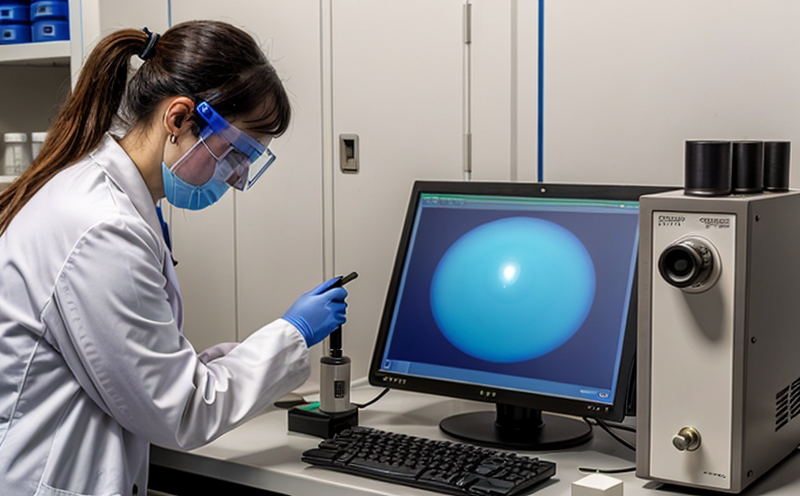BS EN ISO 4833 Microbial Growth Monitoring by Spectroscopy
The BS EN ISO 4833 standard outlines the procedures for monitoring microbial growth through spectroscopic analysis. This method is particularly advantageous in environments where real-time and accurate quantification of microbial activity is crucial, such as in pharmaceuticals, biotechnology, and food safety sectors.
The principle behind this technique lies in the measurement of specific metabolic byproducts or cellular components that indicate microbial growth. By using advanced spectroscopic instruments, we can detect even minute changes in these indicators, providing precise data on the extent of microbial proliferation. This approach is not only highly sensitive but also non-destructive, allowing for repeated sampling without affecting the test subject.
The process typically involves inoculating a sample with the microorganism under investigation and then incubating it to promote growth. Once sufficient growth has been achieved, the sample is analyzed using spectroscopy. The choice of wavelength or range depends on the specific indicator being monitored; for instance, absorbance at 260 nm can be used to measure protein concentration, a key parameter in assessing microbial activity.
Our laboratory adheres strictly to the requirements outlined in BS EN ISO 4833, ensuring accuracy and reliability. We employ state-of-the-art instrumentation, such as UV-Vis spectrophotometers or fluorescence microscopes, tailored to this methodology. The precision of these instruments guarantees that even slight fluctuations in microbial growth can be detected, making our service invaluable for maintaining stringent quality standards.
In addition to the technical aspects, we also provide comprehensive data interpretation services. Our team of experts can help you understand the implications of your test results and offer insights into potential sources of contamination or optimal conditions for growth. This holistic approach ensures that you not only meet compliance requirements but also gain valuable operational intelligence.
The application of BS EN ISO 4833 is wide-ranging, from ensuring product safety in healthcare products to maintaining hygiene standards in food processing facilities. By leveraging this standard, our clients benefit from enhanced reliability and efficiency in their quality assurance processes.
To sum up, the BS EN ISO 4833 methodology represents a cutting-edge approach to microbial growth monitoring that offers unparalleled accuracy and sensitivity. Our laboratory’s proficiency in this area positions us as leaders in providing reliable and compliant services for our clients across various industries.
Benefits
The implementation of BS EN ISO 4833 microbial growth monitoring by spectroscopy brings numerous advantages to businesses operating within the chemical testing sector. Firstly, it ensures compliance with international standards, which is essential for maintaining market access and meeting regulatory requirements.
A key benefit is the ability to achieve real-time monitoring, allowing for prompt detection of any deviations from expected levels of microbial growth. This capability enhances operational efficiency by enabling timely corrective actions, thereby reducing the risk of product contamination or spoilage.
The precision offered by this method also contributes significantly to process optimization. By providing detailed insights into microbial dynamics, it aids in identifying optimal growth conditions and enhancing overall productivity. Furthermore, the non-destructive nature of spectroscopy ensures that samples remain viable for further testing, thus maximizing resource utilization.
From a sustainability perspective, accurate monitoring supports the development of more sustainable practices by enabling early intervention measures aimed at minimizing waste and energy consumption associated with microbial proliferation control.
In summary, adopting BS EN ISO 4833 enhances not only regulatory compliance but also operational efficiency and environmental responsibility. These benefits are critical for maintaining high-quality standards in demanding industries such as pharmaceuticals and food safety.
Eurolab Advantages
At Eurolab, we pride ourselves on offering unparalleled expertise and precision when it comes to BS EN ISO 4833 microbial growth monitoring by spectroscopy. Our state-of-the-art laboratory facilities are equipped with the latest technology, ensuring that every test conducted meets the highest standards of accuracy and reliability.
Our team of highly trained professionals brings extensive experience in this field, providing clients with expert guidance throughout the testing process. From initial consultation to final report generation, our services are designed to meet your specific needs while adhering strictly to international guidelines.
The commitment to excellence extends beyond technical capabilities; we also emphasize clear communication and transparency regarding all aspects of our work. Our reports are meticulously prepared, offering detailed interpretations alongside raw data, ensuring that you have a comprehensive understanding of the results obtained.
Moreover, Eurolab is dedicated to fostering long-term partnerships with its clients through ongoing support and consultation. By leveraging our industry knowledge and resources, we aim to help you make informed decisions based on robust scientific evidence.
In conclusion, choosing Eurolab for your BS EN ISO 4833 microbial growth monitoring needs guarantees access to world-class expertise and unmatched reliability. Let us assist you in achieving superior quality assurance across various sectors.
Environmental and Sustainability Contributions
The application of BS EN ISO 4833 microbial growth monitoring by spectroscopy significantly contributes to environmental sustainability efforts, particularly within the chemical testing sector. By enabling precise and efficient monitoring of microbial activity, this method helps reduce unnecessary resource consumption.
Accurate detection allows for targeted interventions aimed at controlling microbial proliferation, which in turn minimizes waste generation and energy usage associated with traditional control measures. This selective approach ensures that only necessary actions are taken, leading to a more sustainable operational footprint.
In addition to direct environmental benefits, the adoption of this standard also promotes better resource management practices among businesses. By optimizing production processes based on real-time data provided by spectroscopic analysis, companies can enhance their overall efficiency while reducing waste generation and energy consumption.
The transparency offered by Eurolab’s comprehensive reports further encourages responsible decision-making, as clients receive clear insights into both current performance metrics and areas for improvement. This information empowers organizations to implement proactive strategies aimed at fostering a more sustainable future.
Ultimately, the integration of BS EN ISO 4833 microbial growth monitoring by spectroscopy represents an important step towards promoting environmental stewardship within the chemical testing industry. Through rigorous adherence to international standards and cutting-edge technological advancements, we contribute positively towards achieving global sustainability goals.





